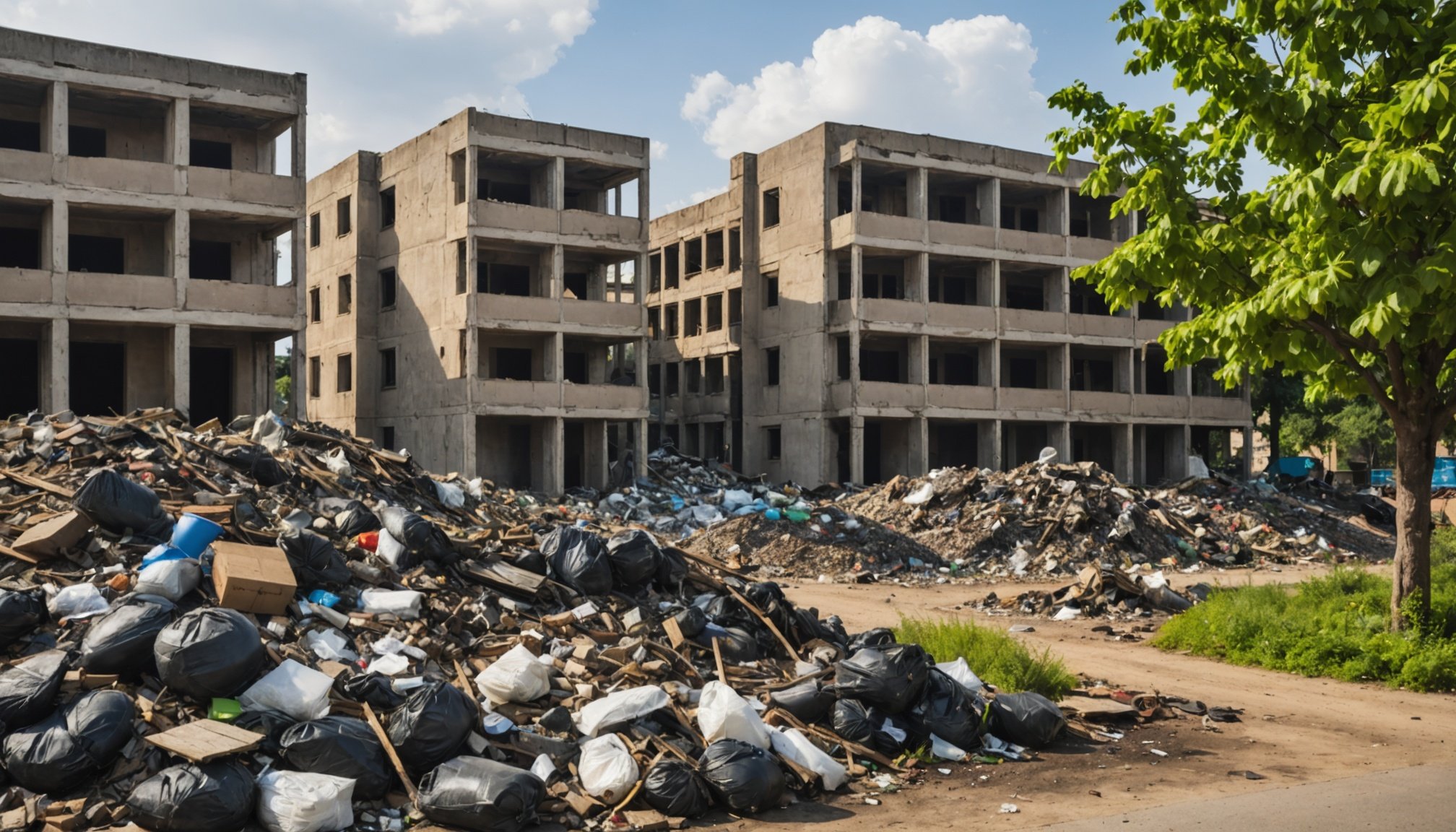Overview of Sustainable Waste Management in Real Estate Development
Sustainable waste management is a core aspect of green real estate development, focusing on reducing the environmental impact of construction-related activities. It encompasses various practices aimed at minimising waste and encouraging the reuse and recycling of materials. Eco-friendly construction practices are increasingly being adopted to achieve sustainability goals, reflecting a shift towards more responsible development.
Today’s real estate industry is witnessing a rise in eco-friendly construction, integrating strategies that conserve resources and reduce carbon footprints. These practices contribute to overall sustainability efforts by promoting efficient resource use and limiting waste. Techniques such as using recycled materials, implementing waste diversion strategies, and adopting innovative technologies are becoming standard.
Additional reading : Empowering energy efficiency: a comprehensive guide to sustainable lighting solutions for large commercial properties in the uk
Waste management plays a pivotal role in enhancing these sustainability efforts, going beyond traditional disposal methods. It involves careful planning and execution of waste reduction strategies, ensuring minimal environmental impact. By strategically managing waste, real estate developers can achieve economic and environmental benefits, paving the way for a more sustainable future in construction. This approach not only aligns with global environmental goals but also enhances the longevity and efficiency of the built environment.
Innovative Waste Management Techniques
The construction industry is seeing a transformation with innovative waste management techniques. By using recycling options and construction waste solutions, developers can improve their sustainability practices significantly.
Additional reading : Navigating contractor partnerships: key strategies for triumph in major real estate developments
Recycling Building Materials
Utilising recycled building materials is vital for eco-friendly construction. Techniques like onsite material segregation and the reuse of concrete, wood, and metals help reduce waste. Notably, using these recycled materials can decrease costs and boost sustainability, making it a preferred strategy in modern developments. Successful projects demonstrate its effectiveness, showcasing reduced environmental footprints and cost savings.
Waste Diversion Strategies
Critical to effective waste management is the implementation of waste diversion strategies. This includes techniques like source separation and sorting, which enhance the recycling process by preventing contamination. Effective separation at the source ensures maximum material recovery and minimizes landfill contributions. Notable success stories highlight how strategic diversion reduces waste and supports sustainability goals.
Utilizing Technology for Waste Management
Digital tools and smart construction technologies are revolutionizing waste reduction. These technologies enable precise tracking and management of construction materials, improving efficiency and sustainability. By adopting these advanced tools, the construction industry can enhance its waste management practices, leveraging technology for a greener future.
Case Studies of Sustainable Developments
In the realm of real estate, successful sustainable projects are paving the way for future developments by showcasing best practices in waste management. These real-life examples illustrate how integrating sustainability from the ground up can lead to remarkable outcomes.
One notable success story is the BedZED eco-village in London, which implemented pioneering waste management techniques. The project focused on minimising waste through precise waste separation and employing advanced recycling options, resulting in a significant reduction of construction waste. By effectively utilizing construction waste solutions, BedZED set an industry benchmark.
Another example is the High Line in New York City, where innovative waste diversion strategies were employed. The redevelopment aimed to reduce landfill contributions by meticulously sorting materials, leading to an efficient reuse and recycling process. This initiative demonstrated that careful planning and execution could lead to a drastic decrease in waste.
These case studies not only highlight the direct benefits of best practices in waste management but also underline the importance of continual innovation and adaptation in the field. Through these projects, the industry is learning invaluable lessons on how sustainability can be seamlessly integrated into real estate development.
Practical Tips for Implementing Waste Management Strategies
Implementing effective waste management strategies in real estate development requires a structured approach. To seamlessly integrate these practices, developers should follow a series of actionable steps that address both planning and execution.
Begin by conducting a comprehensive waste audit. This helps identify potential areas for waste reduction and sets benchmarks for measuring success. Once potential waste streams are identified, developers can choose suitable waste management frameworks. This selection should prioritise sustainable practices and align with the project’s overall eco-friendly goals.
A checklist is a practical tool for planning. It ensures all aspects of waste management, from materials to methodologies, are accounted for. Such lists aid in maintaining consistency across various stages of development.
Engaging stakeholders and the local community is pivotal. Their involvement not only enhances transparency but also fosters collective responsibility toward sustainability. Collaborative efforts can lead to innovative ideas and partnerships that support efficient waste management.
Through these implementation strategies, developers can effectively minimise waste, contributing to a more sustainable and eco-conscious construction industry. Engaging both internal teams and external partners in these processes is key to achieving impactful and sustainable outcomes.
Benefits of Sustainable Waste Management Practices
Sustainable waste management practices in real estate provide numerous benefits, balancing economic viability and environmental responsibility. These practices contribute to significant cost savings by reducing material waste and efficiency in resources used. Real estate developments that integrate sustainable waste management often experience lower disposal costs and utilize recycled materials, which helps conserve financial resources. Moreover, efficient waste reduction strategies enhance project value, making them more appealing to investors.
Environmental benefits represent a core advantage of sustainable waste management initiatives. By minimising landfill use and reducing carbon footprints through recycling and reuse, these practices contribute positively to the environmental impact. As developments strive to reduce ecological damage, they support biodiversity conservation and reduce pollution, ultimately leading to healthier ecosystems.
In the long term, adopting sustainable waste management practices impacts both community and industry sustainability. These practices foster community engagement in green efforts and create job opportunities in recycling and waste management sectors. Industry-wide, they set benchmarks for responsible development and encourage innovation in eco-friendly construction. Emphasizing sustainability encourages the adoption of these practices, leading to a more resilient and adaptable real estate industry ready to meet contemporary environmental challenges.
Challenges and Solutions in Waste Management
Navigating the path to effective waste management involves overcoming several challenges developers face. Common obstacles include limited availability of local recycling facilities, high costs associated with eco-friendly methods, and regulatory complexities. Such barriers can hinder the implementation of efficient waste management practices. However, strategic solutions exist to address these issues, facilitating better execution and success.
Key solutions involve leveraging available resources and fostering collaborations. Developers can partner with waste management agencies and local governments to access support and guidance. These partnerships can reduce costs and provide insights into best practices. Emphasising waste reduction strategies early in project planning helps align with sustainable goals and identify potential obstacles.
The role of policy and regulation is crucial in advancing sustainable waste management. Governments are increasingly introducing supportive frameworks that incentivise eco-friendly construction and waste management initiatives. These policies often encourage the use of recycled materials and waste diversion techniques, driving industrywide changes.
In conclusion, while challenges in waste management persist, proactive solutions and policy support can significantly mitigate these obstacles. By embracing innovative strategies and collaborating with stakeholders, the construction industry can advance towards more sustainable waste management practices.





